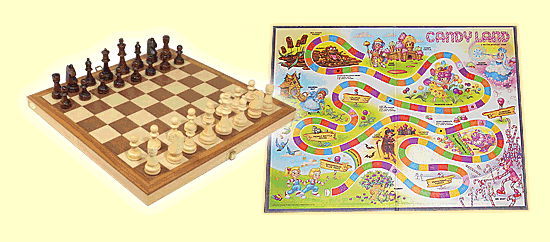Skill and Chance
by Andrew Boyd
Today, skill and chance. The University of Houston's College of Engineering presents this series about the machines that make our civilization run, and the people whose ingenuity created them.

My daughter took great pleasure beating me at the board game Candy Land when she was younger. It’s a simple game. There’s a path on the board made of colored squares ending at Candy Castle. Players draw cards that show a color, then move forward to the next square showing that color. The first one to reach Candy Castle wins the game.
Even at age two my daughter had a fifty-fifty chance of winning. Candy Land is a game involving no skill, just chance. The outcome is decided by the shuffle. There are no decisions since every move is dictated by the cards. The outcome of the game is set in stone before the first card is drawn. All that players can do is watch and see what happens, though it doesn’t seem that way.
Roulette is another game that involves only chance. A ball randomly comes to rest on a spinning wheel. No matter what players bet, they have exactly the same likelihood of winning – or more to the point, losing.
At the other extreme are games that depend entirely on skill. Each move of a chess player is the result of a choice. The gods of fate have no hand. When a world class chess player sits across from a player of limited skill, it’s a virtual certainty the better player will win.
Most games involve a combination of skill and chance. Poker is a good example. Like Candy Land, chance comes into play through the shuffling of the cards. But the outcome of a hand is in part determined by how players wager. A good bluff can turn a losing hand into a winner. Skill is very important in poker, but every player can be beat by the luck of the draw. Poker players have many colorful names for such events. Good poker players only make money on average. Chance is so important that even the best players frequently walk away from the table having lost.
Most popular sports involve both skill and chance. The Boston Red Sox may be a better baseball team than the Chicago White Sox, but with the right hit at the right time, Chicago can beat Boston. The same is true with other sports – football, basketball, golf.
Yet as we play or watch sports, we fail to accept chance even as we acknowledge it. A batter steps to the plate and hits a game winning home run. He’s a star, and the pitcher’s a loser. Never mind that if the ball had been struck only a fraction of an inch lower, it would’ve floated into the center fielder’s mitt for an easy out. Of course, baseball wouldn’t be much fun if we thought of it as a sequence of chance events.
Life, too, is a game of both skill and chance. Warren Buffett is a smart and capable investor, but he’s well aware that his phenomenal financial success is due in part to chance. We can increase our likelihood of success in life by getting a good education, developing our natural skills, and always doing the best we can. Still, great lawyers lose cases; gifted doctors lose patients; and able employees don’t get promoted. It’s important to analyze why we fail. Is there something we could’ve done to change the outcome? But it’s also okay to realize that, sometimes, that’s just the way the ball bounces.
I’m Andy Boyd at the University of Houston, where we’re interested in the way inventive minds work.
References:
Candy Land. Accessed February 26, 2008, from Wikipedia: https://en.wikipedia.org/wiki/Candy_Land.